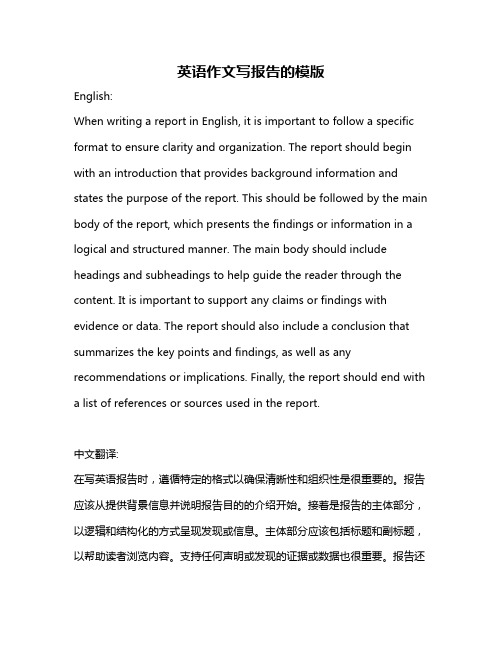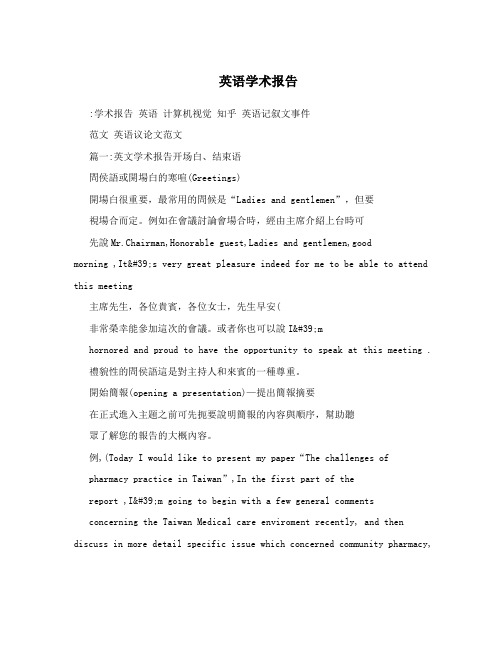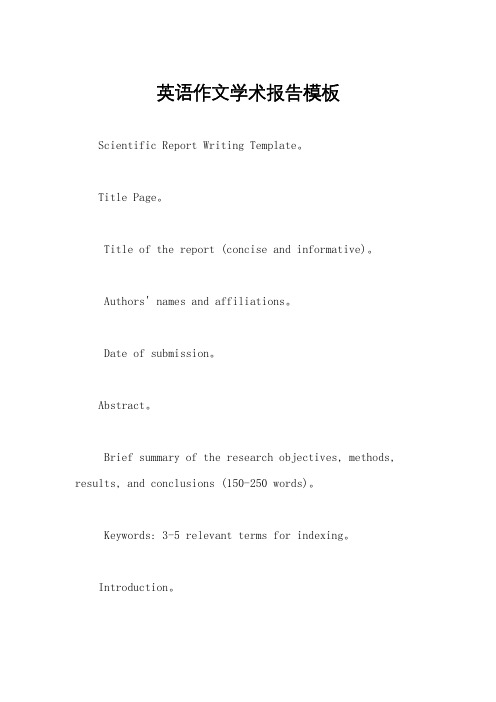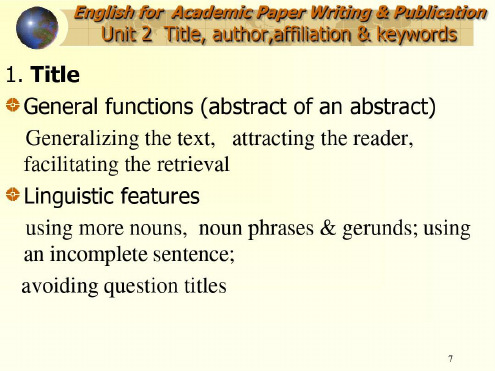学术论文写作报告(英文版)
英语科技论文写作(一)

作业
• 结合你导师给定的课题查文献,列出相关 的文献:中、英文综述文章,中、英文博 士硕士论文、权威书籍、重要杂志文献。 • 查相关的专利、国内外目前开展的项目。
如何写科技学术论文
如何写英语科技学术论文
四川大学制造学院苏真伟教授
Brief CV of Zhenwei Su
• 2004-2009: Sichuan University, professor • 1997-2004: UK Universities visiting scholar,post-doc, research fellow • 1982-1997: Sichuan University, PhD, lecturer, associate professor • 1978-1982: Xian Jiaotong University, Mechanical Engineering Department • 1970-1978: Farmer or worker in Sichuan
如何了解我所在领域最具影响力 的研究人员?
如何选择合适的期刊发表论文?
当我们完成了某项研究之后,通常需要选 择一个合适的途径发表自己的研究成果, 那么怎样找到最合适自己研究领域的期刊 发表发表论文呢?您可以利用Web of Science数据库的检索结果分析功能 (Analyze)来解决这一问题。
眼睛犀利, 才能飞得高!
为什么要阅读文献
我们很多的时候,闷在实验室闭门 造车,实在不如稍抽出一点时间看看 文献。 我的大老板说,要想有成绩,别无 他法,只有读,读,大量的读文献, 尤其国外的。
主要的信息源
• 学术期刊(中文、英文) • 博士、硕士论文(中文、英文) • 学术网站(中文、英文) • 专利网站(中文、英文) • 书籍(中文、英文) 对低级研究人员:中文第一 对高级研究人员:英文第一
写研究报告的格式范文作文

写研究报告的格式范文作文英文回答:Research Report Format.I. Introduction.State the purpose of the report.Provide a brief overview of the topic.II. Literature Review.Discuss relevant research on the topic.Identify the gaps in knowledge that your study will address.III. Methodology.Describe the participants, materials, and procedures used in the study.Explain how data was collected and analyzed.IV. Results.Present the findings of the study in a clear and concise manner.Use tables, graphs, or other visuals to illustrate the data.V. Discussion.Interpret the results of the study.Discuss the implications of the findings for theory, practice, or future research.VI. Conclusion.Summarize the main points of the report.State the conclusions that can be drawn from the study.VII. References.List all sources cited in the report using aconsistent citation style.VIII. Appendices (Optional)。
英语作文写报告的模版

英语作文写报告的模版English:When writing a report in English, it is important to follow a specific format to ensure clarity and organization. The report should begin with an introduction that provides background information and states the purpose of the report. This should be followed by the main body of the report, which presents the findings or information in a logical and structured manner. The main body should include headings and subheadings to help guide the reader through the content. It is important to support any claims or findings with evidence or data. The report should also include a conclusion that summarizes the key points and findings, as well as any recommendations or implications. Finally, the report should end with a list of references or sources used in the report.中文翻译:在写英语报告时,遵循特定的格式以确保清晰性和组织性是很重要的。
英语学术报告

英语学术报告:学术报告英语计算机视觉知乎英语记叙文事件范文英语议论文范文篇一:英文学术报告开场白、结束语問侯語或開場白的寒喧(Greetings)開場白很重要,最常用的問候是“Ladies and gentlemen”,但要視場合而定。
例如在會議討論會場合時,經由主席介紹上台時可先說Mr.Chairman,Honorable guest,Ladies and gentlemen,goodmorning ,It's very great pleasure indeed for me to be able to attend this meeting主席先生,各位貴賓,各位女士,先生早安(非常榮幸能參加這次的會議。
或者你也可以說I'mhornored and proud to have the opportunity to speak at this meeting .禮貌性的問侯語這是對主持人和來賓的一種尊重。
開始簡報(opening a presentation)—提出簡報摘要在正式進入主題之前可先扼要說明簡報的內容與順序,幫助聽眾了解您的報告的大概內容。
例,(Today I would like to present my paper“The challenges ofpharmacy practice in Taiwan”,In the first part of thereport ,I'm going to begin with a few general commentsconcerning the Taiwan Medical care enviroment recently, and then discuss in more detail specific issue which concerned community pharmacy,and how the National Health cave Insurance influence the future of pharmacist career?例,(你亦可將要簡報的摘要條列式的依序說明。
英语作文学术报告模板

英语作文学术报告模板Scientific Report Writing Template。
Title Page。
Title of the report (concise and informative)。
Authors' names and affiliations。
Date of submission。
Abstract。
Brief summary of the research objectives, methods, results, and conclusions (150-250 words)。
Keywords: 3-5 relevant terms for indexing。
Introduction。
Background information on the topic。
Statement of the research problem。
Hypotheses or specific aims。
Literature review: Summarize previous researchrelevant to the study。
Methods。
Detailed description of the research design, including: Participants or subjects。
Variables measured。
Data collection procedures。
Statistical methods。
Results。
Presentation of the data collected。
Statistical analyses and interpretation of findings。
Clear and concise tables, figures, or graphs。
Discussion of the significance of the results。
英文学术论文写作-研究生教学(全英文)_2022年学习资料

English for Academic Paper Writing Publication-Unit 2 Title,author,affiliation keywords-Writing requirement -printing format:following specific requirements of-t e journal-number of authors:4;xxx et al-professional itle:omission-address:the same as letters-multiple au hors-multiple affiliations-internal units-10
English for Academic Paper Writing Publication-Unit 2 Title,author,affiliation keywords-1.Title-General fun tions abstract of an abstract-Generalizing the text,a tracting the reader,-facilitating the retrieval-Lingu stic features-using more nouns,noun phrases gerunds;u ing-an incomplete sentence;-avoiding question titles-
English for Academic Paper Writing Publication-Unit 2 Title,author,affiliation keywords-2.Author/affiliatio -General functions-bearing author's responsibility;fa ilitating retrieval-correspondence;heightening celebr ty-Linguistic features-spelling names HU Jingtao,Hu J ngtao,-LI Ju,Li Ju;-giving correct information about ffiliation no-abbreviations;adequate postal address;z p code-9
英语学术论文写作技巧academic writing skills(全英文版)共38页文档
protection/copyright protection” Discuss the following with a partner: Look at the project title above and highlight the key words/phrases. How is the title framed (e.g. statement/question/heading)? What does the title ask you to do?
- gathering information from various sources;
- organizing this information so that it appropriately answers the needs of the task that the writer has to complete;
The reasons why students carry out extended academic writing activities may s their ideas; to provide evidence to support their ideas; to dispute or support existing theories; to display knowledge.
Internet. e) Write down the details of your sources. f) Decide if you need to do more reading. g) Write the contents page, bibliography, title page and abstract. h) Arrange a tutorial with your tutor. i) Do some reading. j) Decide on a topic. k) Write the first complete draft. l) Highlight/take notes of relevant information. m) Plan the contents in detail. n) Work on establishing a clear focus. o) Make a rough outline plan of your ideas. p) Check that sources are available/accessible.
英语作文报告类范文格式
英语作文报告类范文格式English:When writing a report in English, it is important to follow a specific format to ensure clarity and coherence. The typical structure of a report includes an introduction, background information, methodology, results, discussion, conclusion, and recommendations. In the introduction, provide a brief overview of the topic and the purpose of the report. The background information should include relevant context and any key terms or concepts. The methodology section outlines the research methods employed and any data collection techniques. Results present the findings of the research, often in the form of tables, charts, or graphs. The discussion section interprets the results and analyzes their implications. The conclusion summarizes the main points of the report and offers final thoughts. Recommendations suggest actions to be taken based on the findings. Each section should be clearly labeled and organized logically to guide the reader through the report effectively.中文翻译:在英语写报告时,遵循特定的格式确保清晰和连贯非常重要。
学术英语论文范文精选3篇(全文)
学术英语论文范文精选3篇评价系统(The pprisl Systems)是对系统功能语言学的新进展。
系统功能语言学以系统功能语法为基础。
评价理论是在20世纪90年代对澳大利亚新南威尔士的中学和其他场所语文水平研究的基础上进展起来的。
该研究由Mrtin指导,Croline Coffin,Rick Iedem,Henrike Korner,Dvid Rose,Robert Vee 和Peter White 参与。
这项研究是“写得得体”(Write It Right)科研项目的一部分。
评价理论包括三大次系统:态度,介入和级差。
三大次系统又可以次系统化。
态度系统指对文本,人类行为和现象所作出的推断。
态度有积极和消极之分。
任何句子都传递者积极和消极的评价。
态度可以明确或者含蓄的表达。
态度是指向文化的并与读者的意识形态相关。
态度可以通过表品质的词来表达,如hppy;可以通过心理过程和行为过程来表达,如like;通过情态状语表达,如hppily。
态度包含三个系范畴:情感系统、推断系统和鉴赏系统。
推断系统又可分为社会评判和社会约束。
鉴赏系统又可分为:反应、构成和价值。
介入系统深受Bkhtin (1981,1986)对话性和多语性的影响。
从这个意义层面上讲,介入资源是一种方式,通过这种方式说话者或XX自己介入对话中,一定程度上展示加入、承认、回应、挑战或拒绝其他XX或说话者的声音,或者对其他说话者或XX的回应做出可能的预期。
介入分为对话扩展和对话紧缩。
对话扩展又可次系统化为包容和归属;对话紧缩可次系统化为弃言和借言。
介入可以通过情态词、言剧性表达、模糊语等来实现,如my,it is sid tht等。
级差系统是对态度介入的程度的分级资源,包含语势和聚焦。
语势有强势和弱势之分,聚焦有明显和模糊之分。
级差可以通过一些表程度的词来实现,如some,plusible等。
3.语料本项研究的语料是60篇英文4.研究结果及分析本研究分别从三个次系统对语料进行分析:态度,介入,级差。
英文学术论文写作-研究生教学(全英文)
English for Academic Paper Writing &riting requirements Integrity 1 paragraph about what has been done, especially the author’s own contribution Conciseness essential information, economy of words,no number, equations & mathematical expressions and others Consistency exclusion of non-mentioned information Concentration exclusion of certain elements (figures, tables, literature reference, etc.)
English for Academic Paper Writing & Publication
Unit 3 Abstract
2. Linguistic features Limited length 200 words; 50 ~ 100 words; 500 words Categories descriptive (indicative): general subject matter in a qualitative way informational (informative): findings and results in a quantitative way
English for Academic Paper Writing & Publication
Unit 3 Abstract
- 1、下载文档前请自行甄别文档内容的完整性,平台不提供额外的编辑、内容补充、找答案等附加服务。
- 2、"仅部分预览"的文档,不可在线预览部分如存在完整性等问题,可反馈申请退款(可完整预览的文档不适用该条件!)。
- 3、如文档侵犯您的权益,请联系客服反馈,我们会尽快为您处理(人工客服工作时间:9:00-18:30)。
学术论文写作报告(英文版)Title: An Analysis of Expository Writing in Academic Research PapersAbstract:This report presents a comprehensive analysis of expository writing in academic research papers. The objective of this study is to identify the key components of effective academic writing and provide recommendations for researchers, especially novice writers, to enhance their writing skills. Various sources, including published academic papers and books on the topic, were reviewed and analyzed to support the findings. The report suggests that an organized structure, clear language, logical reasoning, proper citation practices, and adherence to academic writing conventions are essential elements of successful academic writing.1. Introduction:Academic research papers serve as a means of communication among scholars in various disciplines. It is crucial for researchers to present their ideas and findings in a clear and concise manner to facilitate effective knowledge exchange. This report aims to explore the characteristics of expository writing in academic research papers and provide guidelines for researchers to improve their writing skills.2. Organization and Structure:Academic research papers should have a well-organized structure to convey ideas in a systematic manner. The introduction should provide background information and clearly state the research objectives. The body paragraphs should present the mainarguments in a logical and coherent way, supported by relevant evidence. Finally, the conclusion should summarize the findings and provide implications for further research.3. Clarity of Language:Clear and concise language is fundamental in academic writing. Researchers should aim to convey their ideas in a straightforward manner, avoiding jargon and unnecessary complexity. Using simple and precise language helps readers understand the content more easily and efficiently.4. Logical Reasoning:Academic research papers should exhibit a clear and logical flow of thoughts and arguments. Each paragraph should be logically connected to the previous and following ones, and the overall structure should guide readers through the research process. Using appropriate transitions and connecting phrases can improve the coherence and readability of the paper.5. Citation Practices:Proper citation practices are crucial in academic writing to acknowledge the contributions of other researchers and avoid plagiarism. Researchers should meticulously cite all the sources they have referred to using a recognized citation style, such as APA or MLA. Failure to properly cite sources can result in academic dishonesty and reputational damage.6. Adherence to Academic Writing Conventions:Academic writing follows specific conventions, such as using the third person, avoiding personal opinions, and maintaining a formaltone. Researchers should familiarize themselves with these conventions and ensure their papers adhere to them to maintain the integrity and credibility of their research.7. Conclusion:Effective academic writing requires attention to various elements, including the organization and structure of the paper, clarity of language, logical reasoning, proper citation practices, and adherence to academic writing conventions. Novice researchers can benefit from understanding and implementing these key components, ultimately enhancing the quality and impact of their research papers. Continuous practice and seeking guidance from experienced researchers can further improve their writing skills. 8. Recommendations:To further improve academic writing skills, researchers should actively engage in peer-review processes, attend writing workshops and conferences, and seek feedback from their mentors and colleagues. Writing groups and online forums dedicated to academic writing can also provide valuable support and guidance. In conclusion, this report highlights the importance of expository writing in academic research papers and provides recommendations for researchers to enhance their writing skills. By adhering to the identified key components, novice researchers can produce high-quality academic papers that contribute to the advancement of knowledge in their respective fields.9. Key Components of Effective Academic Writing:9.1. Organization and Structure: A well-organized structure is a key component of effective academic writing. It helps readersnavigate through the research paper and understand the flow of ideas. Researchers should ensure that their papers have a clear and logical structure, including an introduction, body paragraphs, and a conclusion. The introduction should provide the necessary background information and context for the research, as well as clearly state the research objectives. The body paragraphs should present the main arguments or findings supported by relevant evidence and analysis. Finally, the conclusion should summarize the key findings and provide implications for future research.9.2. Clarity of Language: Clarity of language is crucial in academic writing. Researchers should strive to communicate their ideas in a clear and concise manner to ensure that readers can easily understand the content. The use of jargon and unnecessary complexity should be avoided. Instead, researchers should use simple and precise language to convey their ideas effectively.9.3. Logical Reasoning: Logical reasoning is a fundamental component of academic writing. Researchers should present their arguments in a logical and coherent manner, providing evidence and analysis to support their claims. Each paragraph should flow logically from one idea to the next, and there should be a clear connection between different sections of the paper. The use of appropriate transition words and phrases can help improve the coherence and readability of the paper.9.4. Proper Citation Practices: Proper citation practices are essential in academic writing to acknowledge the contributions of other researchers and avoid plagiarism. Researchers should carefully and accurately cite all the sources they have referred to intheir papers. This includes both in-text citations and a comprehensive reference list at the end of the paper. Different citation styles, such as APA, MLA, or Chicago, have specific guidelines that researchers should follow. Failure to properly cite sources can have serious consequences, including academic misconduct and damage to one's reputation.9.5. Adherence to Academic Writing Conventions: Academic writing follows certain conventions and standards that researchers need to adhere to. These conventions include using the third person, maintaining a formal tone, and avoiding personal opinions unless specifically requested in certain types of papers, such as opinion or reflection pieces. Researchers should familiarize themselves with the specific conventions of their field or discipline and ensure that their writing aligns with these expectations. Adhering to academic writing conventions helps maintain the integrity and credibility of the research.10. Recommendations for Enhancing Academic Writing Skills: 10.1. Seek Peer Review: Peer review is a valuable process for improving academic writing skills. Researchers should actively seek feedback from their peers and colleagues. They can join writing groups or engage in peer review exchanges to receive constructive criticism and suggestions for improvement. Peer review provides an opportunity to identify areas of weakness or confusion in the writing and make necessary revisions.10.2. Attend Writing Workshops and Conferences: Writing workshops and conferences offer researchers the chance to learn from experts in the field and gain insights on effective academicwriting techniques. These events often provide practical tips, strategies, and resources for improving writing skills. Researchers should take advantage of these opportunities to enhance their writing abilities.10.3. Seek Feedback from Mentors and Colleagues: Seeking feedback from experienced mentors and colleagues can be incredibly helpful in improving academic writing skills. These individuals can provide valuable insights and guidance based on their own experiences. Researchers should actively seek their feedback on drafts and revisions to refine their writing.10.4. Practice Regularly: Like any skill, academic writing requires regular practice to improve. Researchers should set aside dedicated time for writing and make it a habit. Regular practice allows researchers to develop their own writing style, become more comfortable with academic writing conventions, and refine their ability to convey complex ideas clearly.10.5. Utilize Writing Resources: Various writing resources are available to researchers to enhance their writing skills. Academic writing books, online tutorials, and writing guides can provide guidance on grammar, style, and organization. Researchers should take advantage of these resources to expand their knowledge and improve their writing.10.6. Seek Guidance from Writing Centers: Many universities and institutions have writing centers or writing support services that offer individualized assistance to researchers. These centers provide guidance on various aspects of academic writing, such asstructure, language, and citation practices. Researchers should utilize these resources to receive specialized support and feedback on their writing.In conclusion, effective academic writing requires attention to various key components, including organization and structure, clarity of language, logical reasoning, proper citation practices, and adherence to academic writing conventions. Novice researchers can enhance their writing skills by implementing these components and by actively seeking feedback, participating in workshops, and practicing regularly. With time and effort, researchers can improve their ability to communicate their ideas effectively through well-crafted academic research papers.。
